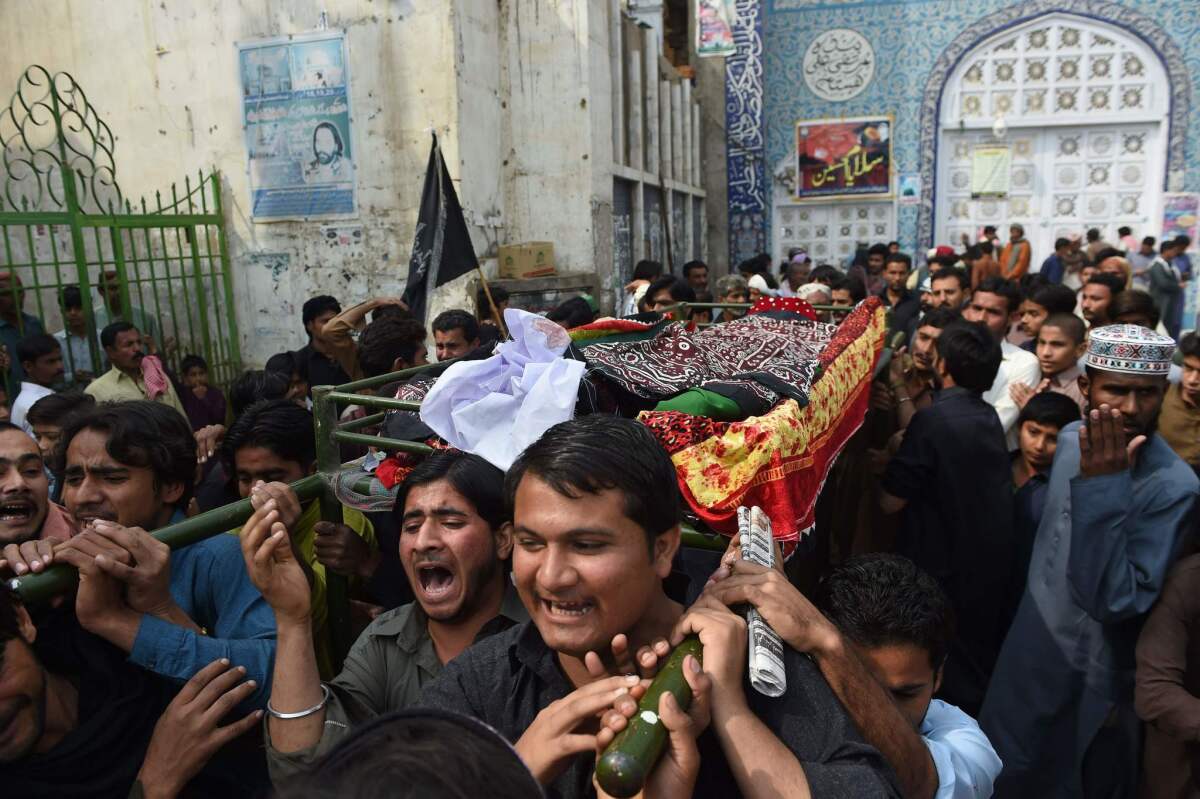Pakistan launches military crackdown as death toll in shrine bombing rises to 88

- Share via
Peshawar, Pakistan — The Pakistani army on Friday arrested or killed dozens of suspected militants and launched artillery rounds at targets in neighboring Afghanistan a day after a suicide bombing at a Sufi shrine killed at least 88 people.
Residents in Pakistan’s Khyber tribal district said security forces fired barrages into Afghanistan’s Nangarhar province, where militants loyal to Islamic State have often found sanctuary.
An Islamic State affiliate claimed responsibility for the bombing Thursday at a shrine to Lal Shahbaz Qalandar, a 13th century Sufi preacher, in southern Pakistan’s Sindh province. Health Ministry officials raised the death toll to 88 people, with approximately 350 wounded, dozens critically.
Security officials said they had killed 44 suspected militants in security operations across the country. Eighteen were killed in the southern port city of Karachi, which lies 100 miles from the shrine.
Pakistani officials have played down the claim by Islamic State loyalists, saying only that the attack came from militants based in Afghanistan. Pakistan closed its border with Afghanistan late Thursday, causing long lines of loaded vehicles at two key highway crossings.
Afghan diplomats were summoned to army headquarters in the city of Rawalpindi and given a list of 76 militants “hiding” in Afghanistan that Pakistan wanted arrested and handed over, officials said.
Afghan officials criticized the Pakistani response. Local officials in Nangharhar province said some 200 rocket shells struck in the border district of Lalpoor, wounding two children and forcing more than 100 families to flee their homes.
“It’s an undeclared war,” said Ahmad Ali, head of the elected provincial council. “People won’t remain quiet and will respond if Pakistan continues.”
Each country has long accused the other of giving shelter to militants that roam across their rugged, porous border.
Shah Husain Mortazawi, deputy spokesman for the Afghan government, said Afghanistan was committed to fighting cross-border terrorism and called on Pakistan to do the same.
“Afghanistan is deeply concerned about the shelling by Pakistan in the border areas and urges it to stop immediately,” Mortazawi said.
The golden-domed shrine remained closed Friday as mourners filled the narrow streets of the town of Sehwan Sharif for funeral processions. Some bereaved family members and other residents chanted slogans against the government for failing to protect the shrine, with one group setting fire to a car before police dispersed the crowd with tear gas, Pakistani news agencies reported.
Islamic State loyalists who claim to be part of the South Asia branch of the militant organization have taken shelter in Nangarhar and elsewhere in eastern Afghanistan. U.S. and Afghan forces have been battling to oust the Sunni Muslim militants for more than a year, including with increased U.S. airstrikes.
Islamic State’s Amaq news agency said the bombing targeted “a Shiite gathering,” although Muslims of all faiths attended the shrine. The Sufi tradition, which emphasizes a personal connection to Islam, has millions of followers across the Muslim world but often has been targeted by Sunni fundamentalist groups.
After a period of relative calm, Thursday’s bombing was the third major attack in Pakistan in less than a week, coming after separate suicide bombings in the eastern city of Lahore and the northern city of Peshawar killed a total of 19 people.
Special correspondent Ali reported from Peshawar, and staff writer Bengali from Mumbai, India. Special correspondent Sultan Faizy contributed to this story from Kabul, Afghanistan.
Follow @SBengali on Twitter for more news from South Asia
UPDATES:
8:05 a.m.: This article was updated with reaction from Afghanistan.
This article was originally published at 6:10 a.m.
More to Read
Sign up for Essential California
The most important California stories and recommendations in your inbox every morning.
You may occasionally receive promotional content from the Los Angeles Times.











